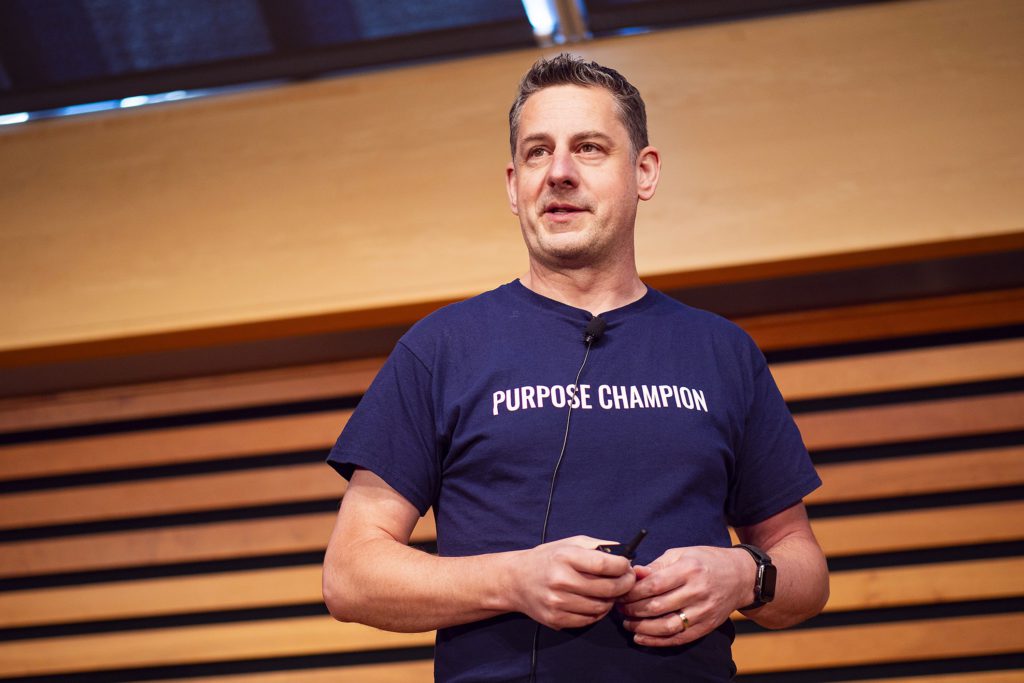Social purpose businesses have the power to create a better world. Unfortunately, our well-established systems often hinder would-be changemakers from taking the leap. By collaborating and educating others, we can change our economic thinking and inspire those interested in social purpose to act.
We spoke with Mike Rowlands, President & CEO at Junxion Strategy and one of the Founding Champions of the Canadian Purpose Economy Project, about how the Project is uniting businesses to accelerate Canada’s transition to a purpose economy.

What inspired the founders of CPEP to start advocating for the Wellbeing Economy?
We’re all veterans of the last few decades’ work toward corporate social responsibility, sustainability, and social impact. While we all see and appreciate the vast societal gains that capitalism has delivered, we also see the deep challenges that exist under unfettered capitalism: income inequalities, the climate crisis, biodiversity loss, social injustices, and more.
We began by exploring how we might encourage more companies to take up a social purpose as the reason they exist. A social purpose business is a company whose enduring reason for being is to create a better world. It is an engine for good, creating social benefits by the very act of doing business. Its growth is a positive force in society, and social purpose businesses do well by doing good.
There’s a strong business case for social purpose businesses: companies benefit from higher customer loyalty, staff engagement and retention, and even higher rates of innovation.
It wasn’t long before we started asking, “How might we develop a social purpose economy in Canada?” As in, an economy powered by the pursuit of long-term wellbeing for all, in which business, regulatory, and financial systems foster an equitable, flourishing, resilient future.
We’re inspired by the possibilities a social purpose economy might bring for all Canadians when collective wellbeing is centred.
What do you consider to be your biggest success as an advocate and professional in this space? Can you share any stories of the impact your work has had that have surprised you?
We have a long way to go before we meet our vision that 25% of Canadian businesses have taken up a social purpose, are authentically operationalizing it, and are collaborating with others to achieve it. But we’ve made some great headway.
Perhaps our biggest success is the recently-launched “A Call to Purpose: Building a Canadian Purpose Economy.” This is a letter co-written by six of Canada’s most prominent CEOs calling on their peers to embrace social purpose in their businesses. Nearly 100 other CEOs have endorsed it, and many leading thinkers (who don’t happen to occupy CEO positions) are also supporting it.
It’s gratifying and exciting to see the names on that list, which includes some of Canada’s most impressive corporations and brands. The credibility that group brings to our vision and mission is significant, which is a meaningful accomplishment in itself.
There have been many surprises in this work, but two in particular come to mind. The first is the credit many CEOs give to their social purpose for inspiring significant innovation and extension of their companies. Whole new enterprises have been established simply because executive teams were able to look differently at the role and scope of their businesses. Secondly, it’s been a very pleasant surprise to learn of deep interest in social purpose in companies that we expected would be the laggards. Some of the most ardent supporters of social purpose are leading some of the most traditional businesses, including natural resource-based companies that are so important to the Canadian economy.
How do you feel that shifting to a Wellbeing Economy will help make the world better?
There’s an old, familiar saying in business: “What gets measured gets managed.” When all our attention is focused on financial metrics (i.e. revenue and margins at the company level, GDP and household incomes at the level of the economy), we attend to financial returns. We too easily ignore “externalities” like carbon emissions, insufficient wages, and erosion of the living systems on which we most deeply rely.
By shifting our thinking toward human and planetary wellbeing, we avail ourselves of an entirely different suite of metrics — new, better measures of a more holistic definition of success.
I could get all philosophical and talk about the history of economic thinking and the problems of a reductionist, Western scientific worldview, but it’s simpler and more intuitive than that: surely the very purpose of society is to assure our collective wellbeing! And our economy exists not to serve only those who hold wealth, but society as a whole, so our economics simply must be refined to focus on delivering wellbeing for all.
Consider the UN’s 17 Sustainable Development Goals (SDGs) — the world’s answer to the question, “What must we do in order to live together on Earth sustainably?” Each of the SDGs points to a profound enhancement of planetary and human wellbeing, and they were unanimously agreed upon by 192 UN member nations. These must guide our economic thinking from the level of national economic policy to the decisions in executive suites.

What are some of the challenges you typically face in advocating for the Wellbeing Economy?
The greatest challenge in advocating for a Wellbeing Economy is the status quo. Many powerful forces benefit from “the way it’s always been.” So, how do we inspire new thinking?
There’s a great quote attributed to Buckminster Fuller: instead of changing the old system, “build a new model that makes the existing model obsolete.” That’s essentially what we’re aiming to do. By introducing new ways of thinking about economic systems — starting with the way the world does business — we’ll introduce a new system anchored in metrics that prioritize human and planetary wellbeing.
Of course, a great many people were educated and have built their lives, enterprises, and ideas of success in an old system, an old paradigm. Can we “teach old dogs new tricks?” Looks like there are ways we can, including attaching social purpose to leaders’ sense of impact and legacy, showcasing “traditional” businesses that are embracing the new paradigm, and uplifting the success stories of those who are charting a different path in their work and careers.
Are there any upcoming initiatives or projects related to your work/the Wellbeing Economy you’d like to share?
We’re definitely keen to continue generating support for “A Call to Purpose.” The more people endorse and support that letter, the more momentum it will build as we engage CEOs and business leaders across the country, as well as other economic actors and decision-makers.
Next, though, we’re keen to equip professional advisors to support companies that want to make a transition to social purpose. We’re aiming to develop a new credential for corporate social responsibility professionals to help with that.
We’re also working with industry and trade associations, encouraging them to adopt a social purpose, and then we encourage their members to do so as well. This could really amplify and accelerate this work.
What can people do to help spread the word about or take action toward transitioning to the Wellbeing Economy? How can they support your mission?
The Canadian Purpose Economy Project exists to accelerate the transition to the purpose economy. In order to engage national ecosystem actors, we need the support of equally ambitious funders, partners, and amplifiers.
A handful of generous sponsors have supported our work to date. We’re keen to meet with others.
We’re already partnering extensively with conveners, educators, associations, networks, and others to advance aspects of our work. Again, we’re keen to welcome other partners into the work we’re doing across our 10 levers of change.
People can join the social purpose community by signing up for our newsletter and referring associations in their network to us so we can accelerate social purpose in business through their memberships.And finally, we’re grateful to have this opportunity to amplify the work that’s going on under our Project banner. The more conversations we can spark, the more action we can inspire. And the more action we can inspire, the faster we’ll all benefit from a purpose economy.
This story was featured in the Make The World Better Magazine:


